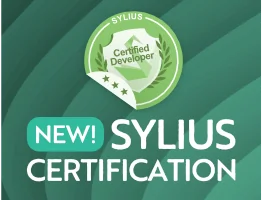Configuration
Add the extensions to your mapping
Some of the extensions use their own entities to do their work. You need to register their mapping in Doctrine when you want to use them.
1 2 3 4 5 6 7 8 9 10 11 12 13 14 15 16 17 18 19 20 21 22 23 24 25 26 27 28 29 30 31
# app/config/config.yml
# (or config/packages/doctrine.yaml if you use Flex)
doctrine:
orm:
entity_managers:
default:
mappings:
gedmo_translatable:
type: annotation
prefix: Gedmo\Translatable\Entity
dir: "%kernel.project_dir%/vendor/gedmo/doctrine-extensions/src/Translatable/Entity"
alias: GedmoTranslatable # (optional) it will default to the name set for the mapping
is_bundle: false
gedmo_translator:
type: annotation
prefix: Gedmo\Translator\Entity
dir: "%kernel.project_dir%/vendor/gedmo/doctrine-extensions/src/Translator/Entity"
alias: GedmoTranslator # (optional) it will default to the name set for the mapping
is_bundle: false
gedmo_loggable:
type: annotation
prefix: Gedmo\Loggable\Entity
dir: "%kernel.project_dir%/vendor/gedmo/doctrine-extensions/src/Loggable/Entity"
alias: GedmoLoggable # (optional) it will default to the name set for the mapping
is_bundle: false
gedmo_tree:
type: annotation
prefix: Gedmo\Tree\Entity
dir: "%kernel.project_dir%/vendor/gedmo/doctrine-extensions/src/Tree/Entity"
alias: GedmoTree # (optional) it will default to the name set for the mapping
is_bundle: falseNote
If you are using the short syntax for the ORM configuration, the mappings
key is directly under orm:
Note
If you are using several entity managers, take care to register the entities for the right ones.
Note
The mapping for MongoDB is similar. The ODM documents are in the Document
subnamespace of each extension instead of Entity.
Note
If you added any of these mappings, be sure to update your schema to add the new table(s) - i.e. by generating and executing a migration.
Configure the entity managers
You have to activate the extensions for each entity manager for which you want to enable the extensions. The id is the id of the DBAL connection when using the ORM behaviors. It is the id of the document manager when using mongoDB.
This bundle needs a default locale used if the translation does not exists in
the asked language. If you don't provide it explicitly, it will default to
en.
1 2 3 4 5 6 7 8 9 10 11 12 13 14 15 16 17 18 19
# app/config/config.yml
# (or config/packages/stof_doctrine_extensions.yaml if you use Flex)
stof_doctrine_extensions:
default_locale: en_US
# Only used if you activated the Uploadable extension
uploadable:
# Default file path: This is one of the three ways you can configure the path for the Uploadable extension
default_file_path: "%kernel.project_dir%/public/uploads"
# Mime type guesser class: Optional. By default, we provide an adapter for the one present in the Mime component of Symfony
mime_type_guesser_class: Stof\DoctrineExtensionsBundle\Uploadable\MimeTypeGuesserAdapter
# Default file info class implementing FileInfoInterface: Optional. By default we provide a class which is prepared to receive an UploadedFile instance.
default_file_info_class: Stof\DoctrineExtensionsBundle\Uploadable\UploadedFileInfo
orm:
default: ~
mongodb:
default: ~1 2 3 4 5 6 7 8 9 10 11 12
<!-- app/config/config.xml -->
<!-- (or config/packages/stof_doctrine_extensions.yaml if you use Flex) -->
<container xmlns:stof-doctrine-extensions="http://example.org/schema/dic/stof_doctrine_extensions">
<stof-doctrine-extensions:config default-locale="en_US">
<stof-doctrine-extensions:orm>
<stof-doctrine-extensions:entity-manager id="default" />
</stof-doctrine-extensions:orm>
<stof-doctrine-extensions:mongodb>
<stof-doctrine-extensions:document-manager id="default" />
</stof-doctrine-extensions:mongodb>
</stof-doctrine-extensions:config>
</container>Activate the extensions you want
By default the bundle does not attach any listener. For each of your entity manager, declare the extensions you want to enable:
1 2 3 4 5 6 7 8 9 10
# app/config/config.yml
# (or config/packages/stof_doctrine_extensions.yaml if you use Flex)
stof_doctrine_extensions:
default_locale: en_US
orm:
default:
tree: true
timestampable: false # not needed: listeners are not enabled by default
other:
timestampable: true1 2 3 4 5 6 7 8 9 10 11 12 13 14 15 16 17
<!-- app/config/config.xml -->
<!-- (or config/packages/stof_doctrine_extensions.yaml if you use Flex) -->
<container xmlns:stof-doctrine_extensions="http://example.org/schema/dic/stof_doctrine_extensions">
<stof-doctrine-extensions:config default-locale="en_US">
<stof-doctrine-extensions:orm>
<stof-doctrine-extensions:entity-manager
id="default"
tree="true"
timestampable="false"
/>
<stof-doctrine-extensions:entity-manager
id="other"
timestampable="true"
/>
</stof-doctrine-extensions:orm>
</stof-doctrine-extensions:config>
</container>Same is available for MongoDB using document-manager in the XML files
instead of entity-manager.
Caution
If you configure the listeners of an entity manager in several configuration files, the last one will be used. So you have to list all the listeners you want to detach.
Use the DoctrineExtensions library
All explanations about this library are available on the official DoctrineExtensions documentation.

